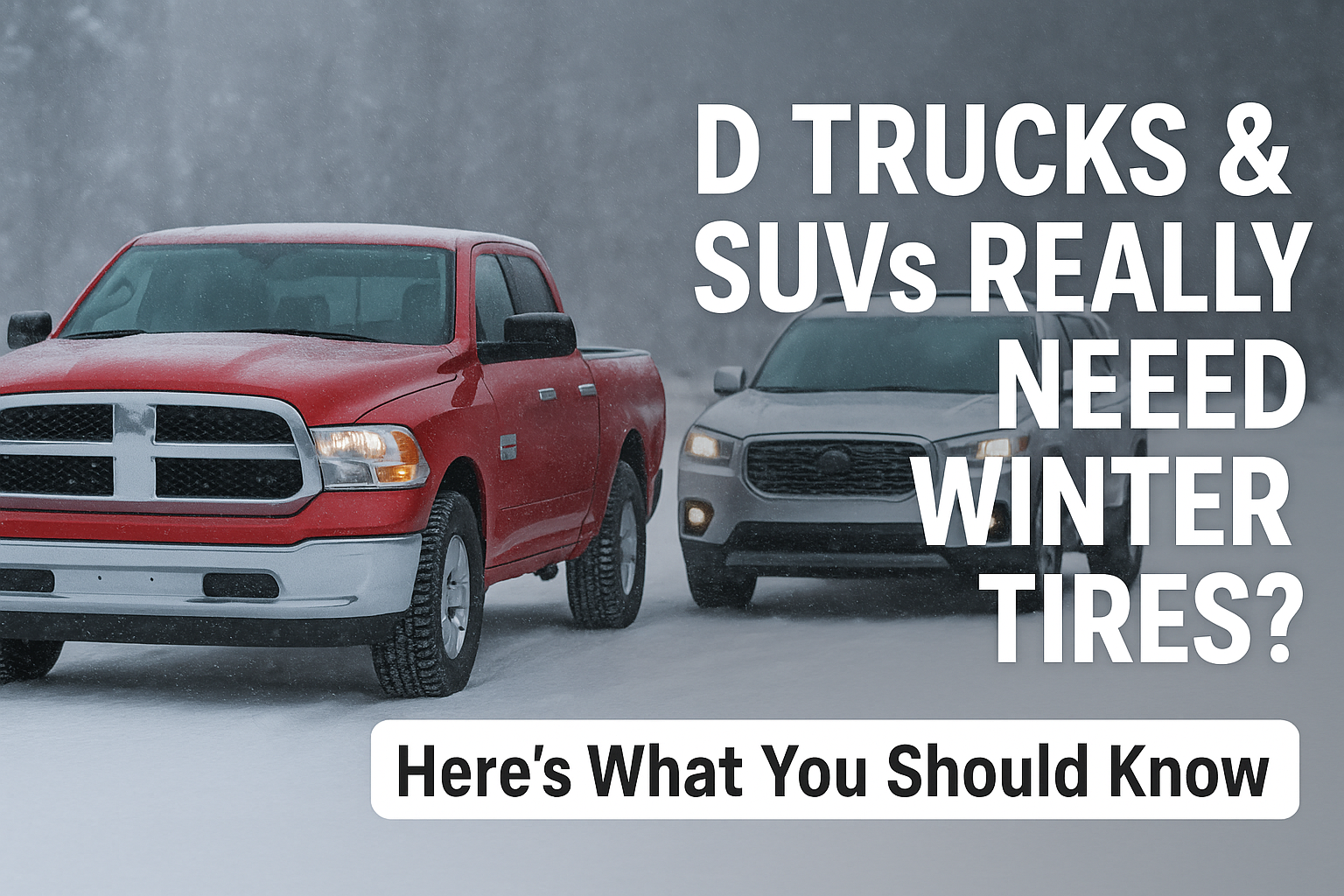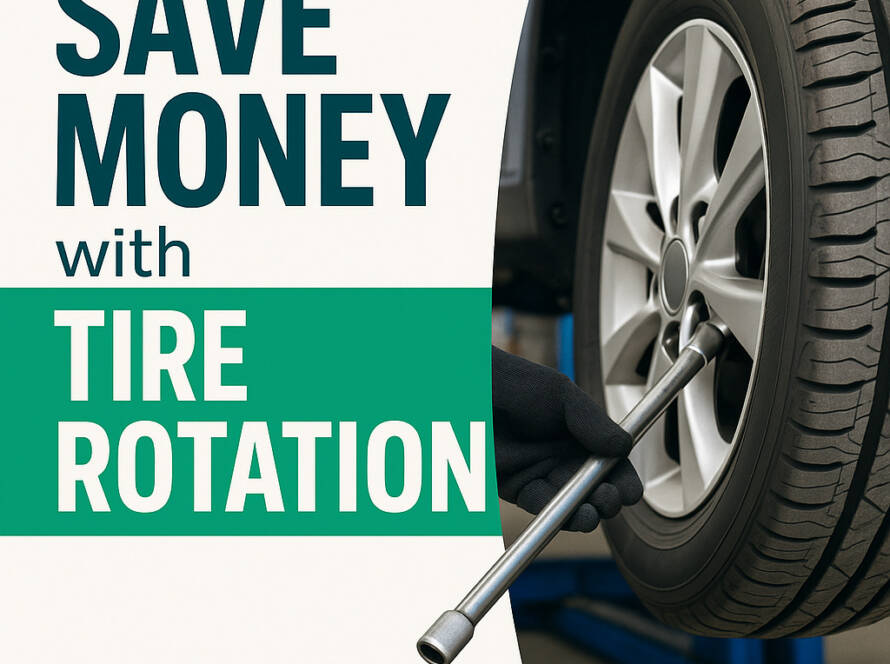As temperatures drop and snow starts to blanket roads, many drivers of trucks and SUVs ask the crucial question: Do trucks & SUVs really need winter tires? After all, these larger, heavier vehicles often come equipped with all-wheel-drive (AWD) or four-wheel-drive (4WD) systems, giving a sense of invincibility in snowy or icy conditions.
But here’s the truth—AWD or 4WD doesn’t replace the performance benefits that winter tires provide. These specialized tires are engineered to perform in low temperatures, offering improved grip, shorter braking distances, and better control. Ignoring the need for winter tires on trucks and SUVs can be a costly—and dangerous—mistake.
Let’s break down the reasons why winter tires matter, especially for larger vehicles.
Understanding the Difference Between Winter, All-Season, and All-Terrain Tires
Winter Tires:
Made with a rubber compound that remains flexible in cold weather, winter tires have deep tread depths and specialized patterns that help dig into snow and ice. They also feature fine slits called sipes to increase traction on slick surfaces.
All-Season Tires:
These are built for moderate conditions. While they offer decent grip in light snow, their compound stiffens in cold weather, reducing traction significantly. They’re a jack-of-all-trades, master of none.
All-Terrain Tires:
Popular among truck and SUV owners, all-terrain tires are rugged and versatile. However, they are often not certified for severe winter conditions unless marked with the Three-Peak Mountain Snowflake (3PMSF) symbol.
Summary Comparison Table
| Tire Type | Best Season | Winter Performance | Durability | Ride Comfort |
|---|---|---|---|---|
| Winter Tires | Winter | Excellent | Moderate | High |
| All-Season Tires | Spring/Fall | Poor to Fair | High | Very High |
| All-Terrain Tires | Year-Round | Fair (if 3PMSF rated) | High | Moderate |
Why Winter Tires Are Not Just for Small Cars
There’s a dangerous misconception that because trucks and SUVs are large and heavy, they don’t need winter tires. In reality, their size can work against them in icy conditions. Heavier vehicles can slide further on ice and take longer to stop. Winter tires provide the necessary friction to help these vehicles stop sooner and maintain better control.
Think of it like this: just because a vehicle is bigger doesn’t mean it defies the laws of physics.
How Winter Tires Enhance Braking and Handling in Cold Weather
Winter tires remain soft and pliable at temperatures below 45°F (7°C), allowing them to conform to the road surface and maximize contact. This increases traction and shortens braking distances. On icy or snow-packed roads, a few extra feet in stopping distance can be the difference between a near-miss and a collision.
Key Benefits:
- Faster stops on ice
- Better acceleration on snow
- Improved cornering in slushy conditions
Key Features of Winter Tires for Trucks & SUVs
- 3PMSF Certification: Guarantees winter performance.
- Deeper Tread Depths: Improves snow clearing.
- Aggressive Siping: Enhances grip on slick surfaces.
- Wider Grooves: Prevent slush and water buildup.
Real-World Performance: Winter Tires vs. All-Season Tires on SUVs & Trucks
Numerous road tests and consumer reports highlight that trucks and SUVs fitted with dedicated winter tires perform significantly better than those equipped with all-season alternatives. On snow-covered roads, braking distances can be reduced by up to 30% when using winter tires.
For example, a full-size SUV traveling at 30 mph may stop in 50 feet with winter tires, compared to nearly 70 feet with all-season tires—a critical difference during emergency braking scenarios.
Highlights from Road Test Results:
- Traction: Winter tires grip more efficiently on compacted snow and ice.
- Stability: Vehicles maintain better lane control, especially during cornering.
- Confidence: Drivers feel more in control, reducing stress and fatigue in bad weather.
4WD and AWD Aren’t Enough Without Winter Tires
It’s easy to assume that four-wheel drive (4WD) or all-wheel drive (AWD) systems will keep you safe. While they certainly help with acceleration and getting through deep snow, they do not improve braking or cornering.
Here’s the distinction:
- AWD/4WD: Helps you go.
- Winter Tires: Help you stop and steer.
Combining AWD with winter tires offers the best of both worlds—enhanced acceleration and confident handling.
Tire Pressure in Winter: What Truck & SUV Owners Should Know
Cold temperatures cause air to contract, leading to reduced tire pressure. For every 10°F drop in temperature, tire pressure decreases by roughly 1 PSI. Low tire pressure can lead to:
- Poor traction
- Reduced fuel economy
- Faster tread wear
Tips:
- Check tire pressure weekly in winter.
- Inflate to the manufacturer’s recommended PSI (found on the door placard).
- Use TPMS (Tire Pressure Monitoring System) alerts as early warnings, not final checks.
Common Myths About Winter Tires for Trucks & SUVs
Let’s bust a few persistent myths:
| “AWD is enough for snow.” | Not without proper winter tires. |
| “Winter tires wear out fast.” | Only if used in warm months. |
| “You only need two winter tires.” | Mixing tires can lead to loss of control—install all four. |
| “They’re too expensive.” | Cost of damage or accidents is higher. |
When and Where Winter Tires Are Legally Required
In some regions, winter tires are mandatory by law during colder months, especially in mountainous or high-snowfall areas.
Legal Requirements by Region:
- Canada: Quebec mandates winter tires from Dec 1 to March 15.
- USA: Some areas in Colorado, Oregon, and Washington require winter-rated tires or chains.
- Europe: Many countries including Germany, Austria, and Sweden have seasonal tire laws.
How to Choose the Right Winter Tires for Your Truck or SUV
When selecting winter tires, consider:
- Tire Size: Match your vehicle’s specs.
- Load Rating: Ensure it supports the vehicle’s weight.
- Brand Reputation: Stick to trusted names like Michelin, Bridgestone, Nokian, or Continental.
- Terrain Needs: City driving vs. off-road snow trails.
Look for the 3PMSF symbol, not just M+S (Mud and Snow), as the former meets stricter snow performance criteria.
Do Winter Tires Increase Fuel Consumption?
Winter tires may slightly decrease fuel efficiency due to their softer compound and deeper tread. However, the safety benefits far outweigh the minor drop in mileage—especially when avoiding the fuel cost of an accident.
Key Points:
- Softer rubber = more rolling resistance.
- Lower PSI in winter can also impact mileage.
- Proper inflation and alignment mitigate most of the effect.
Installation Tips and Tire Storage Advice
When to Switch:
- Once temperatures stay consistently below 45°F (7°C).
- Avoid early-season storms by installing in late October to early November.
Storage Tips:
- Store in a cool, dry place.
- Stack tires flat (or use wall mounts).
- Avoid exposure to direct sunlight and heat.
Use tire bags or covers to protect the rubber from dust and UV rays.
Studded vs. Studless Winter Tires: Which is Better for SUVs & Trucks?
Studded Tires
- Provide superior grip on ice and packed snow.
- Can be noisy and damage pavement.
- Banned or restricted in some areas.
Studless Tires
- Use advanced rubber and tread designs.
- Perform well on snow, slush, and wet roads.
- More versatile and road-friendly.
Unless you frequently drive on icy, rural roads, studless tires are generally better for most SUV and truck owners.
FAQs About Winter Tires for Trucks & SUVs
1. Do I need four winter tires or just two?
Always install all four winter tires to ensure balanced traction and control.
2. Can I leave winter tires on year-round?
No. They wear out faster in warm weather and reduce fuel efficiency.
3. Are snow chains better than winter tires?
Chains are a temporary solution for deep snow; winter tires are a season-long solution.
4. How do I store my off-season tires?
Clean them, stack flat or hang, and store in a dry, shaded area with protective covers.
5. Will winter tires fit my factory rims?
Yes, as long as the size matches. Some people buy a second set of rims for winter use.
6. Are there specific brands better for trucks/SUVs?
Yes. Consider brands like Michelin X-Ice Snow, Bridgestone Blizzak, and Nokian Hakkapeliitta.
Final Verdict: Should You Invest in Winter Tires for Your Truck or SUV?
Absolutely. If you regularly drive in temperatures below freezing or encounter snow and ice, winter tires are essential—even for trucks and SUVs. They complement, not replace, the benefits of 4WD and AWD. With proper use and storage, they’re a safe, cost-effective investment that pays off in performance, confidence, and peace of mind.




